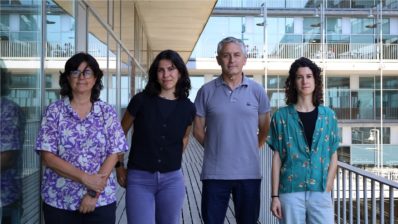Mental health is as crucial as physical health, and we are increasingly aware of it. According to the latest European Health Survey, more than 6% of European people suffer from depression. In a post-industrial society, focused on the processing of information, this problem is even more present. In addition, the isolation and insecurity and anguish caused by the Covid-19 pandemic have highlighted this problem more than ever.
In the academic context, the situation is no different. In fact, various studies from the last four years show that research personnel, and in particular doctoral students, have a higher risk of suffering from mental health problems than the general population.
The Barcelona Biomedical Research Park (PRBB) and its centers are taking action on the matter. In order to improve the general well-being of their staff, several of the centers offer, for example, psychological care services. In addition, the PRBB training program, Intervals, offers courses in mindfulness, stress management or time management, and the park also organizes social activities such as beach volleyball, yoga or even an orchestra and a choir – all of them activities that have been shown to improve the mental health and well-being of the staff.
Although mental health is important at all levels, according to surveys, PhD students get the worst of it. For this reason, according to Fernando G. Benavides, director of the Center for Research in Occupational Health (CiSAL) at UPF-IMIM, “the doctoral programs have among their responsibilities to take care of the mental health of their students.”
“The doctoral programs have among their responsibilities to take care of the mental health of their students”
Fernando G. Benavides (CISAL, UPF-IMIM)
We spoke with Fernando and Regina López, MELIS project manager, about what is being done at the level of the Department of Medicine and Life Sciences (MELIS-UPF) to take care of the mental health of the PhD students. They also tell us about ReMO (Researcher Mental Health Observatory), a European research network focused on the mental health of research staff.
Regina, where do we start from? What is the mental health status of the MELIS-UPF students?
In 2019 we created a predocs mentoring committee, made up of two principal researchers, 2 PhD students, and myself. Our first action was precisely to create a questionnaire on the well-being and mental health of the doctoral students. Of 141 students, only 42 responded (slightly less than a third), and of those who did, most were satisfied, although it is true that a few people were having a hard time. In general, the main concern was a certain existential void about what to do after the doctoral thesis … Some were very clear about continuing in the academy, but others were very hesitant – because the experimental part had not gone well and they were afraid of not publishing well. and not getting a good position; or because they were disenchanted with the academic world or they saw more opportunities outside the academy … And these, they felt some anguish and concern about their professional future.
And what have you done with this information, has it led to concrete actions?
Well, precisely with these results in mind we organized the first “Career week”, together with the Intervals Program of the PRBB, the Center for Genomic Regulation (CRG) and the Barcelona Institute of Global Health (ISGlobal), in which we showed the students various alternatives to an academic career. Almost 300 people, from the different PRBB centers, participated, it was a success!
Also as a result of the survey, we sent more information to the students of the existing services, because we saw that many did not know them, such as all the courses offered or the UPF psychological assistance service.
“As a result of the survey, we organized a” Career week “and sent more information to the students of the psychological assistance services already existing at UPF”
Regina López, MELIS-UPF
In addition, this year we wanted to repeat and improve the survey on well-being in doctoral students, and we would like to make it something to be done on a regular basis. For this we have had the help of Fernando and Cristina Portellano, who have optimized it, and the predoctoral student Amaya Ayala who has joined the project in the phase of collecting and analyzing the results of the survey.
Our goal is to make two presentations of the results of these surveys, one for predocs and one for principal investigators (PIs). In fact, I think that the ideal thing would be to design a questionnaire also for PIs, to have other perspectives and a more complete picture of the global situation.
Thanks Regina.
Fernando, your CiSAL group is an expert in Working Conditions Surveys. How is the academic world different from other professions?
A special characteristic of the doctorate is that it is a temporary employment relationship by definition, so it is not easy to make comparisons with other work areas. Furthermore, it is also a mostly indirect employment relationship, because the person who pays is not usually ‘your direct boss’, but a third party, for example, the funding institution that offers the scholarship. Thus, although it is an economic activity, the doctorate has many peculiarities due to the intensity of the work, with long hours that are not always foreseeable, due to the nature of the work that is done and last but not least, the salaries that are normally low for the cost of living, for example in a city like Barcelona.
How have you adapted the survey since last year? What kinds of things are included in the survey?
On the one hand, the length of the survey had to be adjusted; It is quite long, which gives more information, but also the more extensive, the less quality … Another of the main changes has been to go from some open questions to more specific ones, with concrete answers, to facilitate the comparison from year to year, and perhaps also with other institutions. In fact, we have drawn on ideas from other European surveys, specifically the resources of the COST REMO action.
After adapting the survey, we did a pilot test to see if there were things that were not clear, and in June we launched it. We are now analyzing the results.
What is the next step, are you going to monitor how the situation evolves?
The ideal would be to do the survey on a regular basis, to carry out a longitudinal study over the years and see the evolution of the situation. Although it must be taken into account that the predoctoral community is a population in training, very changing, in 3 or 4 years it has been completely renewed!
Finally, tell us more about ReMO (Researcher Mental Health Observatory). What is the objective of this initiative?
The objective is to coordinate and share experiences and initiatives, both research and intervention, that are being carried out from different European countries (but also in Australia, New Zealand or the USA) on mental health in academia.
The project started in the middle of the pandemic, and in November we have the first face-to-face meeting in Brussels, let’s hope it continues!
“The aim of ReMO is to coordinate and share experiences and initiatives on mental health in academia in Europe and beyond”
How many people participate and what profiles do they have?
Mental health in academia is an issue that is gaining a necessary role, because the number of people who may be affected is continuously increasing. Most of the members of ReMO are professionals of psychology, psychiatry and medicine in general; few of us come from the world of epidemiology. For this reason, in general, a more clinical perspective prevails, more oriented towards the individual person. In our group, however, we have a more systemic vision, we think of structural and organizational interventions, which are adopted by Universities and PhD programs … Management at the individual level is not enough, although neither if it is done exclusively from the field institutional. It is a classic in public health to carry out individual and population preventive strategies.
What is your role in ReMO?
Right now I am part of the Management Committee, on the Spanish side, and I participate more actively in the workpackage (working group) that systematically reviews the scientific literature. And there is a lot! Although most are quite recent. It was only in 2017, just 4 years ago, that the seminal article by sociologist Katia Levecque, from Belgium, was published, showing alarming data on the frequency of mental problems among doctoral students. Since then, studies have only appeared, and several editorials have been published about it in the main scientific journals, such as Nature or Science. The problem worries.
What are the most important factors regarding mental health during the PhD?
It is obvious to me that although there are many factors related to the personality and character that an individual expression has, the context is essential, since it determines the labor relations. Let’s not forget that it is a labor relationship subject to regulatory regulations that are sometimes very complicated, and it is a very important formative period that is going to leave its mark. That is why I believe that it is necessary to value very positively that the MELIS-UPF doctoral program in Biomedicine has assumed its responsibility in this matter, with the survey they did last year and now this second one that will surely help to make decisions that protect the health of our students.
Any final advice on what to do at the institutional level to take care of the mental health of the research staff?
I have two suggestions: let’s improve our understanding of the problem with the best possible information, and incorporate those affected, our students, into decision-making. They are the ones who know best the working and employment conditions that can affect your health.







